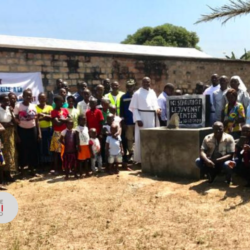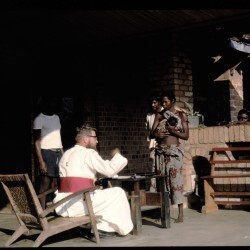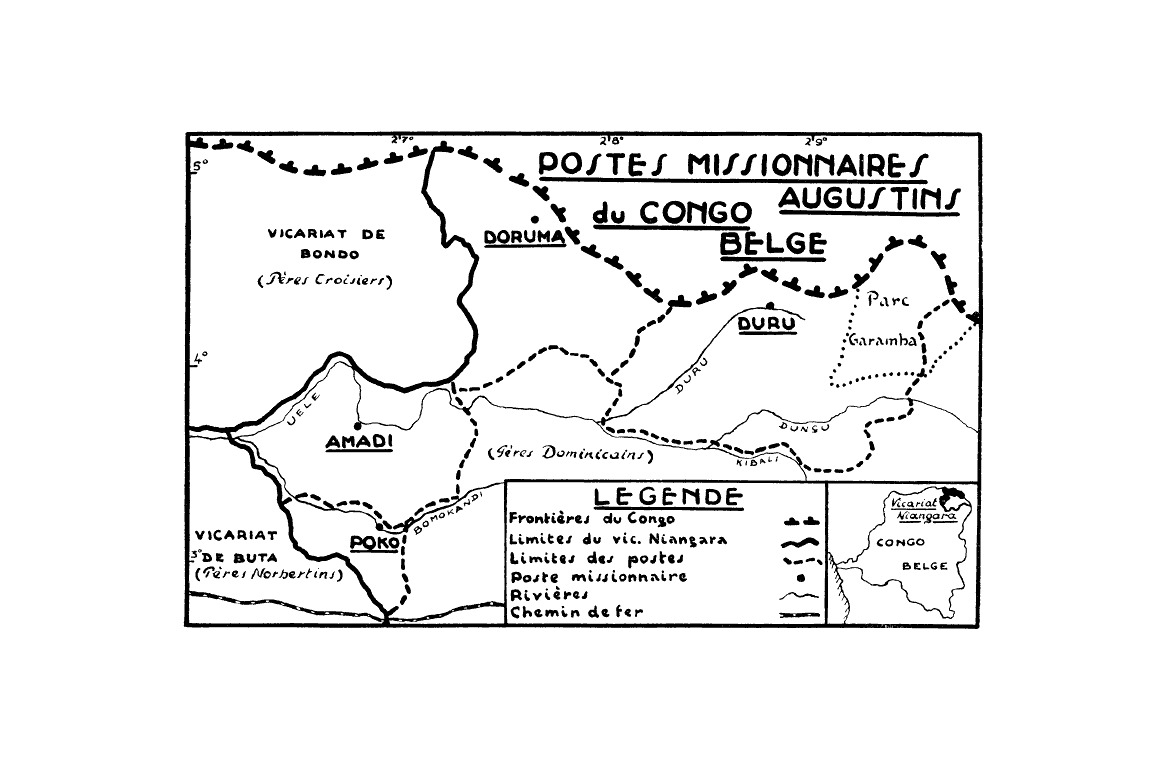History of the Mission in Congo
The beginning
As early as the 1880s, consideration was given to starting a mission in the Congo. The idea was revived by Father Stefanus Colman in 1929, but only became reality in 1952. Provincial Emmanuel Van Berkel accepted the invitation of Mgr. De Wilde, Dominican, to send Belgian Augustinians as missionaries to Congo. The first four Belgian missionaries arrived in the Apostolic Vicariate of Niangara, where the Dominicans worked, in July 1952. Theodorus Wilhelmus Van den Elzen and Libertus Coremans went to Poko. Mattheus Baggen settled in Doruma with Bruno Van Mierlo. However, Mattheus Baggen died a few months (September) after his arrival from menengitis. At the beginning of 1953 there were already 13 Belgian missionaries. Besides Poko and Doruma, Duru, Amadi, Ngilima and Dungu-Bamokandi were the places where they carried out their missionary work.
In 1958, the Niangara vicariate was divided. The Apostolic Prefecture of Doruma was founded and entrusted to the Augustinian Fathers, who now had 21 confreres. Father Wilhelmus van den Elzen becomes the first Apostolic prefect. In 1960 the Dominican Fathers asked to take over the college of Notre-Dame in Dungu
Because the work was expanding and the lack of missionaries was great, Mgr. Van den Elzen invited religious from other provinces to come to Congo. In 1958 the Franciscan Sisters of the Holy Family arrived. In 1959, the German Augustinians decided to join their Belgian brothers. At the beginning of 1962 the Augustinian Sisters of Dendermonde followed and at the end of the same year three Spanish Augustinians also arrived. In 1963 the Schwestern von Missionsërtzlichen Institut arrived.
Just when the prefecture was in full development, the rebellion broke out and paralyzed the country from 1964 to 1966. Although there were no casualties among the Augustinians and other religious in this region, the material and moral damage was enormous and has left its mark to this day.
In 1968, the prefecture of Doruma became a diocese and the apostolic prefect Wilhelmus van de Elzen became the first residential bishop of Doruma.
The pastoral life that was completely disrupted by the rebellion is given new impetus. The minor seminary is reopened and construction of a new cathedral in Dungu begins. From that time on, several other religious congregations came to the diocese. In 1969, the Fréres de Instruction Chrétienne (F.I.C.) came to strengthen the mission, and later in 1970 the brothers and sisters of the Comboniani also arrived on site. The congregation of the Consolata followed in December 1972 and finally Les Soeur Grises de Montreal in 1973.

Pastoral and Development work
The main and first goal of the missionaries is the proclamation of the Gospel. They themselves initially devoted all their energy to this end. They developed a working relationship with catechumens at mission posts, but they also paid great attention to the chapels in the bush.
At the same time, they paid special attention to the development of the population, as evidenced by the college and hospital in Dungu. They worked hard and well and the diocese looked forward to a bright future. When rebellion came, almost everything was destroyed. After this painful period, reconstruction began with new courage. The Augustinians opened a secundary school. After a difficult period, the college of Dugu regained its former momentum under the encouragement of the Brothers for Christian Education (FIC). In 1970, the German brothers started a carpentry school in Poko. In 1975 she was taken over by the FIC. The Sisters of the Good Council transformed their pedagogical institute into a Normal School. They tailored their education to the development of Congolese women.
After the rebellion and Zairization, Mgr. Van den Elzen with a reorganization of medical, social and economic services. The Project de Développement de la Zone Rurale de Dungu was founded. The intention was to develop various projects, with the help of foreign NGOs, so that they would become self-financing over time.
At the head was the Office for Development (diocese), which supervised and coordinated the two departments of projects:
a) public utility works, medical care, technical services, development committee and pastoral-social service (the missions)
b) education, the hydroelectric power plant, agricultural training center in Ndendule (C.F.A), and a cooperative association that provided guidance and development in various areas (Cooproco: Fondation de la Coopérative de Production et de Consommation de Dungu).
Many of these projects continue to this day, albeit with difficulty. The north-east of Congo has again been ravaged by wars since President Kabila and his son took office.

The Growth of the Augustinian Order
As originally agreed, priority was given to the training of native clerics. When there were enough native priests, the Augustinians began the formation of Congolese confreres. An Augustinian juniorate is founded in Dungu. The first postulants started in 1984. The first Congolese Augustinian was Guileaume Misbisiegbe. In 1988 the first novices received the order's habits. The philosophical training of the first brothers took place in the study house of the Irish Augustinians in Joss (Nigeria) in 1989.
Due to political and administrative difficulties in Nigeria, it was decided to establish a study house in Kinshasa. The philosophy students attend classes at the Saint Augustin intercongregational institute. The theologians continue their studies at the Institut Mazenot of the Oblate Fathers.
During the General Chapter of the Order in Rome in 2001, the option was taken to establish a common African theology in Nairobi, Kenya. In 2003, six Congolese Augustinians were working independently in the parishes of Poko and Amadi. In the same year, the last Belgian Augustinian left Congo, Koen Impens. Although the number of brothers is growing, it is still a vicariate and we have to wait until it gains full independence as a province. Until now it is still connected to the Belgian and German provinces. There are currently six convents. The Augustinians lead various schools in Dungu and Kinshasa. To date, 42 have been solemnly professed.

